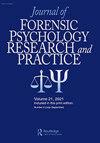The impact of COVID-19 restrictions on social relationships of forensic psychiatric outpatients with preexisting social network-related problems: A mixed methods study
IF 1.1
4区 心理学
Q4 CRIMINOLOGY & PENOLOGY
Journal of Forensic Psychology Research and Practice
Pub Date : 2022-03-14
DOI:10.1080/24732850.2022.2041689
引用次数: 0
Abstract
ABSTRACT This study aimed to explore the impact of the COVID-19 restrictions on social relationships of forensic psychiatric outpatients with preexisting social network-related problems. Data from 70 participants of an ongoing randomized controlled trial, investigating the effectiveness of a social network intervention among forensic psychiatric outpatients, were examined. Demographic characteristics, quality of social relationships, loneliness, and social support were assessed at baseline. During the COVID-19 pandemic, an additional questionnaire that contained quantitative and qualitative questions regarding the impact of COVID-19 restrictions on social relationships was administered. Participants showed high levels of loneliness and dissatisfaction with social relationships before COVID-19. The majority of forensic outpatients perceived no changes on social relationships due to the COVID-19 restrictions. Qualitative results revealed some participants already lived socially isolated. Negative changes on social relationships were related to deterioration of social contacts, interruption of daytime activities, changed mental health care, and well-being. Emotional loneliness predicted deteriorated general and romantic relationships. These findings suggest that social relationships of forensic patients with preexisting social network-related problems remain of concern throughout the COVID-19 pandemic.COVID-19限制对已有社交网络相关问题的法医精神科门诊患者社会关系的影响:一项混合方法研究
摘要本研究旨在探讨COVID-19限制对已有社交网络相关问题的法医精神科门诊患者社会关系的影响。一项正在进行的随机对照试验调查了社会网络干预在法医精神科门诊患者中的有效性,研究了70名参与者的数据。在基线时评估人口统计学特征、社会关系质量、孤独感和社会支持。在2019冠状病毒病大流行期间,进行了额外的问卷调查,其中包含有关COVID-19限制对社会关系影响的定量和定性问题。在COVID-19之前,参与者表现出高度的孤独感和对社会关系的不满。大多数法医门诊患者认为,由于新冠肺炎的限制,社会关系没有发生变化。定性结果显示,一些参与者已经过着与世隔绝的生活。社会关系的负面变化与社会接触的恶化、白天活动的中断、心理保健的改变和幸福感有关。情感孤独预示着一般关系和恋爱关系的恶化。这些发现表明,在COVID-19大流行期间,先前存在社交网络相关问题的法医患者的社会关系仍然令人担忧。
本文章由计算机程序翻译,如有差异,请以英文原文为准。
求助全文
约1分钟内获得全文
求助全文
来源期刊
CiteScore
1.80
自引率
12.50%
发文量
53

 求助内容:
求助内容: 应助结果提醒方式:
应助结果提醒方式:


